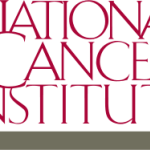- 行业: Government; Health care
- Number of terms: 6957
- Number of blossaries: 0
- Company Profile:
The National Cancer Institute (NCI) is part of the National Institutes of Health (NIH), which is one of 11 agencies that compose the Department of Health and Human Services (HHS). The NCI, established under the National Cancer Institute Act of 1937, is the Federal Government's principal agency for ...
A synthetic guanine derivative with antiviral activity. As the active metabolite of ganciclovir, ganciclovir-5-triphosphate (ganciclovir-TP) appears to inhibit viral DNA synthesis by competitive inhibition of viral DNA polymerases and incorporation into viral DNA, resulting in eventual termination of viral DNA elongation.
Industry:Pharmaceutical
A synthetic heparan sulfate mimetic with potential anti-angiogenic and antineoplastic activity. PG545 inhibits the cleavage of heparan sulfate from cell surface proteoglycan by heparanase and thus inhibits the neovascularization induced by interaction between heparan sulfate and other extracellular matrix proteins. In this manner, this agent may have the potential to slow the progression of growth of solid tumors.
Industry:Pharmaceutical
A synthetic heptapeptide identical to endogenous angiotensin-(1-7) with vasodilator and antiproliferative activities. Therapeutic angiotensin 1-7 may inhibit cyclooxygenase 2 (COX-2) and the production of proinflammatory prostaglandins and may activate the angiotensin-(1-7) receptor Mas, resulting in diminished tumor cell proliferation. Activation of the angiotensin-(1-7) receptor Mas, a G-protein coupled, seven transmembrane protein, may down-regulate the phophorylation and activation of Erk1 and Erk2 in the Erk1/Erk2 Mapk signaling pathway. In the renin-angiotensin system, the vasodlilating activity of angiotensin- (1-7), hydrolysed from angiotensin II by the type I transmembrane metallopeptidase and carboxypeptidase angiotensin converting enzyme 2 (ACE2) in vivo, counteracts the vasoconstricting activity of angiotensin II.
Industry:Pharmaceutical
A synthetic heterocyclic carboxaldehyde thiosemicarbazone with potential antineoplastic activity. Triapine inhibits the enzyme ribonucleotide reductase, resulting in the inhibition of the conversion of ribonucleoside diphosphates to deoxyribonucleotides necessary for DNA synthesis. This agent has been shown to inhibit tumor growth in vitro.
Industry:Pharmaceutical
A synthetic hydroxamic acid derivative with potential antineoplastic activity. Prinomastat inhibits matrix metalloproteinases (MMPs) (specifically, MMP-2, 9, 13, and 14), thereby inducing extracellular matrix degradation, and inhibiting angiogenesis, tumor growth and invasion, and metastasis. As a lipophilic agent, prinomastat crosses the blood-brain barrier.
Industry:Pharmaceutical
A synthetic imidazoquinoline Toll-like receptor 7 (TLR7) agonist with immunostimulating and potential antitumor activities. TLR7 agonist 852A binds to and activates TLR7, thereby stimulating plasmacytoid dendritic cells (pDC) through the TLR7-MyD88-dependent signaling pathway. Activation of pDC results in secretion of interferon alpha, the production of proimflammatory cytokines, the upregulation of co-stimulatory molecules, and enhanced T and B-cell stimulatory responses.
Industry:Pharmaceutical
A synthetic imidazoquinoline with antineoplastic activity. Acodazole intercalates into DNA, resulting in disruption of DNA replication. Use of this agent has been associated with significant cardiotoxicity.
Industry:Pharmaceutical
A synthetic indolocarbazole multikinase inhibitor with potential antiangiogenic and antineoplastic activities. Midostaurin inhibits protein kinase C alpha (PKCalpha), vascular endothelial growth factor receptor 2 (VEGFR2), c-kit, platelet-derived growth factor receptor (PDGFR) and FMS-like tyrosine kinase 3 (FLT3) tyrosine kinases, which may result in disruption of the cell cycle, inhibition of proliferation, apoptosis, and inhibition of angiogenesis in susceptible tumors.
Industry:Pharmaceutical
A synthetic indolocarbazole with antineoplastic activity. Edotecarin inhibits the enzyme topoisomerase I through stabilization of the DNA-enzyme complex and enhanced single-strand DNA cleavage, resulting in inhibition of DNA replication and decreased tumor cell proliferation.
Industry:Pharmaceutical
A synthetic isopropylamino-propanol derivative used as an antihypertensive, hypotensive and antiarrhythmic. Atenolol acts as a peripheral, cardioselective beta blocker specific for beta-1 adrenergic receptors, without intrinsic sympathomimetic effects. It reduces exercise heart rates and delays atrioventricular conduction, with overall decreasing oxygen requirements.
Industry:Pharmaceutical
